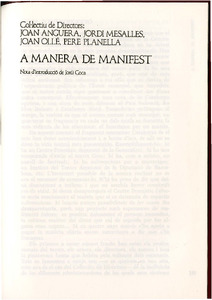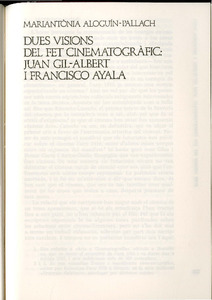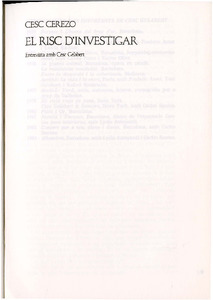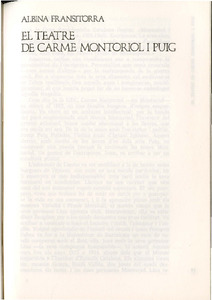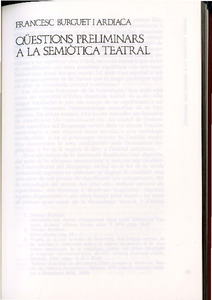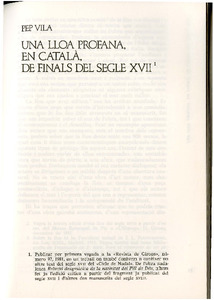Listar 1984: Núm.: 25 por título
Mostrando ítems 1-6 de 6
-
A manera de manifest
Artículo
Estudis escènics: quaderns de l'Institut del Teatre. 1984, Núm. 25
Acceso abierto<p>Theatrical activity is waning in Catalonia because of the exigencies of commercial profit. There is an urgent need to set up a theatre of investigation and this requires a theatre law, decentralized theatre policies and ... -
Dues visions del fet cinematogràfic: Juan Gil-Albert i Francisco Ayala
Artículo
Estudis escènics: quaderns de l'Institut del Teatre. 1984, Núm. 25
Acceso abierto<p>In the year 1955 the writer Juan Gil-Albert published a brief text entitled <em>Contra el cine </em>in which, as a mature man and author, he approaches the subject of cinematography. Francisco Ayala had already ... -
El risc d'investigar
Artículo
Estudis escènics: quaderns de l'Institut del Teatre. 1984, Núm. 25
Acceso abierto<p>This is an interview with the self-taught dancer and choreographer Cesc Gelabert. While we accompany him through his choreographies he shows us the loneliness of a long distance runner, the discoveries during the long ... -
El teatre de Carme Montoriol i Puig
Artículo
Estudis escènics: quaderns de l'Institut del Teatre. 1984, Núm. 25
Acceso abierto<p>Carme Montoriol Puig was born in Barcelona in 1893 and died there in 1966. A self-taught woman, she studied music and foreign languages. She acquired a thorough knowledge of French, Italian, German and English. From the ... -
Qüestions preliminars a la semiòtica teatral
Artículo
Estudis escènics: quaderns de l'Institut del Teatre. 1984, Núm. 25
Acceso abierto<p>This article tries to shed light, by going over a series of texts, on whether it is possible or legitimate to make a semiotic analysis of the theatre and, at the same time, to delimit the relevance —the nature, so to ... -
Una lloa profana, en català, de finals del segle XVII
Artículo
Estudis escènics: quaderns de l'Institut del Teatre. 1984, Núm. 25
Acceso abierto<p>The playlet <em>(lloa) </em>is a minor genre, a sort of prologue to the main play. Its purpose is to prepare the audience and its aim is didactic. The lloa we publish here reached us in a mutilated state; it ...


